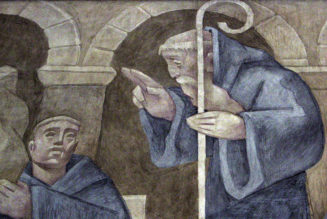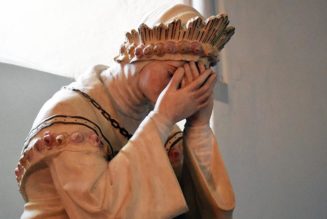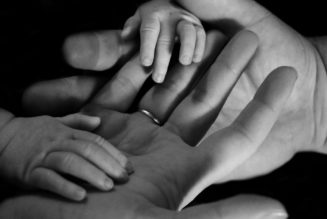
We would be hell-bound if not for Jesus. If we don’t believe that then the Second Sunday of Easter, Divine Mercy Sunday, loses all its power.
But many of us — most of us? almost all us? — simply don’t believe that it’s true that we are “hell-bound without Jesus.” We have the vague sense that people used to believe in hell and damnation but that we are smarter now. And we think: Didn’t Vatican II say the opposite? Something about how everyone is fine now, without needing to feel guilty all the time?
But if we aren’t headed to hell without Jesus, then he didn’t have to suffer, he didn’t have to die, and Divine Mercy Sunday is meaningless.
All of Sunday’s readings act as if we are, indeed, hell-bound without Jesus. In the Gospel, Jesus comes to the apostles who are locked away in fear, and shows them — all of them, not just Thomas — the wounds in his hands and side then says something with a stark and harsh meaning, if we take it seriously.
He shows them the wounds he got doing his Father’s will, and then tells them: “As the Father sends me, so I send you.” The meaning is clear: They too are sent to suffer. But they “rejoice” at what he says because they know that this is very good news compared to what was true before.
St. Peter, who suffered again and again and eventually died for the faith, realized that this call to suffer with Christ was worth it. In the Second Reading, he writes: “Rejoice, although now for a little while you may have to suffer through various trials … for praise, glory and honor at the revelation of Jesus Christ.”
You will suffer — but rejoice anyway, he says. Why?
Suffering with Christ now will prevent a greater suffering without him.
As Vatican II put it, “A monumental struggle against the powers of darkness pervades the whole history of man. … Caught in this conflict, man is obliged to wrestle constantly if he is to cling to what is good, nor can he achieve his own integrity without great efforts and the help of God’s grace.”
The fact is, life is hell without Jesus — because life is mired in sin without Jesus.
Life is sin on the national level, for starters. The high schoolers I help teach recently read Black Elk Speaks, the flawed but fascinating retelling of the story of Black Elk, a Lakota Indian who lived through some of the major flashpoints of the history of America’s Westward expansion. Two things became clear to everyone who read this: First, that the Americans were brutal, uncaring, and starkly unjust in their treatment of the American Indians (unprecedentedly, historically brutal and unjust); and, second, that the American Indians themselves had been brutal, uncaring and starkly unjust to each others’ tribes for generations.
In fact, look at any nation’s history and you will find that it is a history of brutality and injustice — as a victim sometimes and sometimes as a perpetrator. Sin is in the background of the story of how the English language came to be, through Viking, French, Anglo-Saxon and other conquerors. But no people has been immune from original sin. The world as we know it was shaped by sin.
But sin has also shaped each of our personal histories.
Our whole life is marked by sin. Children are beautiful, open and loving — but are also prone to scheming and lying. Worse, we learn as children how sinful others are. Many people are nearly crippled with shame at something that they did or someone else did to them as children, something sinful and ugly.
We grow up wounded by sin and our personality develops, in part, by sinning even more to compensate: We are wounded by self-doubt, so we develop a blind pride to cover it up. We fear we are unlovable, so we become vain; dressing, speaking or throwing our weight around to get some sin-tainted approval — a flirtatious look, a sarcastic laugh, or begrudging respect.
As we enter adulthood, our sin dominates our life in new ways: The constant anger of unforgiveness, the constant busyness our greed demands, the lust that is a fire that never goes out — especially since we feed it with fresh fuel constantly. We establish ourselves a little in life and find ourselves sinning against our spouse, even while we find ourselves judgmentally unwilling to overlook our spouse’s sins. Our envy fuels our self-aggrandizement, which fuels our workaholism, which leaves us stressed and anxious.
We grow old lacking faith, and if we do nothing to strengthen it, our faith fades to dark on a dimmer switch. Since we don’t talk to God we don’t know him, and since we don’t know him we don’t trust him, and since we don’t trust him the future looks hopeless. And then our love fails as we grow increasingly stuck on the small routines of comfort that we insist must be exactly what we want, when we want it, the way we want it, for as long as we want it. The temperature in the room, the way the food is prepared, the right cover on the right pillow — it all adds up to low-key sloth and gluttony that nonetheless makes everything (and, often, everyone) subservient to our appetites.
Are we therefore headed to hell?
Well, we aren’t headed to heaven! That’s a place where people who sacrifice for others go — people who turn their gaze up and out from their own egos. In heaven, I will never be the center of attention, I will never get to insist on “my way” — everything will be His way. A lot of us will have a hard time agreeing to that.
But hell doesn’t wait until the afterlife. We start it here when we make ourselves the center of the universe. This tears up our relationships, because we are too petty to tolerate pettiness, and so are the petty people in our lives. It tears up our communities, because our neighbors don’t ever fall in love with the beautiful Way of Love that is Christian holiness. Because they don’t ever see that. They only see us.
But heaven doesn’t wait until the afterlife, either.
After showing them his wounds and telling them they are sent, Jesus breathes on the apostles to give them the Holy Spirit, saying “Whose sins you forgive are forgiven them.” He gives them the power to break the cycle of sin that bogs down our lives.
And it works.
History changed utterly after the Christian revolution. Real virtue was introduced into political systems, real service and true understanding on the national level and the personal level. We each see it personally in the parts of our nation’s history that are truly great and in the loving acts we have given and recieved over the course of our lives.
The First Reading, from Acts, describes what Divine Mercy did for the first Christians: “They devoted themselves to the teaching of the apostles and to the communal life, to the breaking of bread and to the prayers.” If you tease out the meaning of every phrase, you will see what this is describing: Christians were faithful to the magisterium, active in parish life; they frequented the Mass and talked to God every day.
To this day this is the recipe for a happy life — a way to start heaven early, on earth. As the reading continues: “Awe came upon everyone, and many wonders and signs were done through the apostles. All who believed were together and had all things in common … They ate their meals with exultation and sincerity of heart, praising God and enjoying favor with all the people. And every day the Lord added to their number those who were being saved.”
Life is hell without Jesus, on earth and in eternity — but life is heaven when we live it with him. Divine Mercy transformed the culture once and it can do it again, starting this Sunday at Mass; starting with us.
Image by Reinhardi from Pixabay








